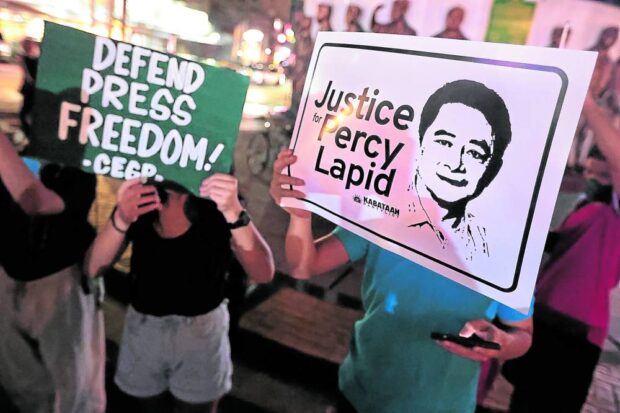HRW: Masterminds in deaths of Juan Jumalon, Percy Lapid still at large

Activists and peace advocates stage an indignation rally on October 4, 2022 in Quezon City to condemn the murder of broadcaster Percival “Percy Lapid” Mabasa. — File photo from GRIG C. MONTEGRANDE
MANILA, Philippines — There is still much more that needs to be done for the Philippines to be able to remove its title as one of the world’s most dangerous places to practice journalism.
This statement comes from Human Rights Watch (HRW), an international non-governmental organization, which emphasized that the Philippine government needs to exert more efforts to ensure a safe environment for journalists.
The organization’s statement was issued following the April 29 arrest of another suspect in the on-air shooting of radio broadcaster Juan Jumalon as well as the May 6 sentencing of the gunman behind the killing of radio commentator Percival “Percy Lapid” Mabasa.
“The arrest in the Jumalon killing and the sentencing of Lapid’s murderer, who accepted a plea bargain, do not directly address the bigger issue in those two cases. And that is that the individuals who masterminded these two murders remain at large,” said HRW.
“Rather than resting on the laurels of the pending Jumalon trial and the incomplete Lapid case, the Marcos administration needs to ratchet up its efforts to protect journalists,” it emphasized.
Article continues after this advertisement“It should immediately end the practice of red-tagging journalists and ensure harassment and killings of journalists are fully investigated and prosecuted, whoever is responsible,” it noted.
Article continues after this advertisementThe group then called on foreign governments to “scrutinize” the Philippine government on its “claims on media freedom” as well as ending “impunity for attacks on the press.”
On November 23, 2009, the Maguindanao Massacre took place.
READ: Maguindanao massacre: The wound of PH impunity that will never heal
It is considered the “single deadliest attack on the media in modern times,” as the massacre led to the deaths of 58 people, 32 of whom were media workers.